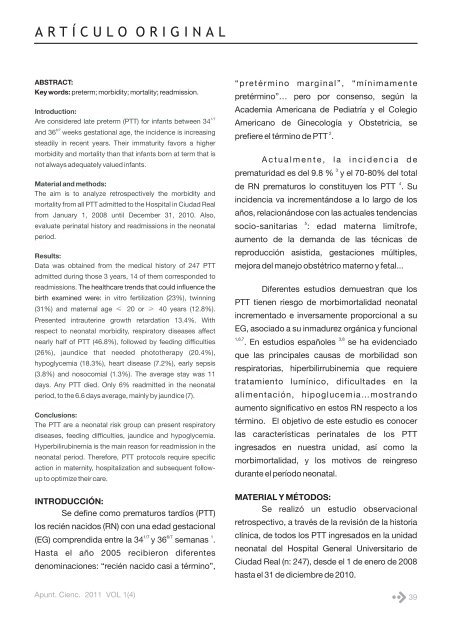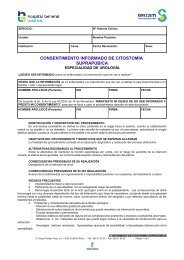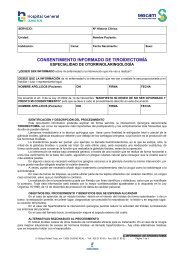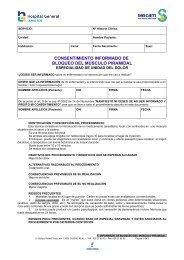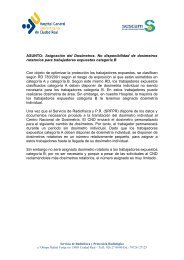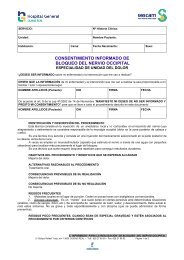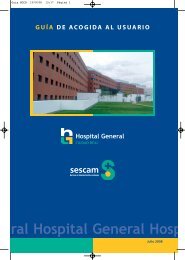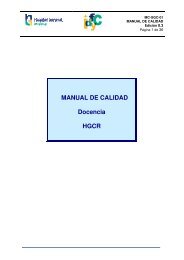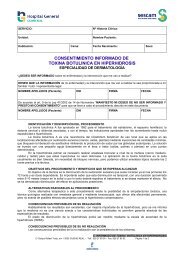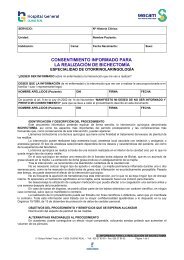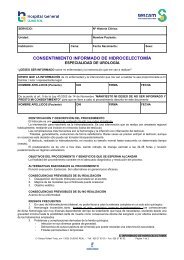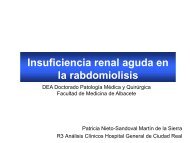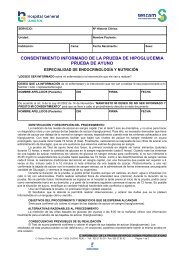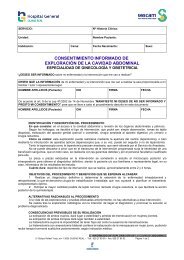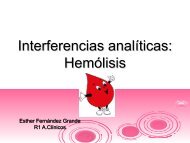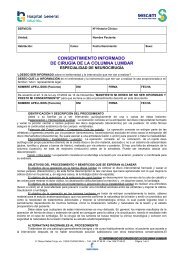APUNTES DE CIENCIA - hgucr
APUNTES DE CIENCIA - hgucr
APUNTES DE CIENCIA - hgucr
Create successful ePaper yourself
Turn your PDF publications into a flip-book with our unique Google optimized e-Paper software.
A R T Í C U L O O R I G I N A L<br />
ABSTRACT:<br />
Key words: preterm; morbidity; mortality; readmission.<br />
Introduction:<br />
1/7<br />
Are considered late preterm (PTT) for infants between 34<br />
6/7<br />
and 36 weeks gestational age, the incidence is increasing<br />
steadily in recent years. Their immaturity favors a higher<br />
morbidity and mortality than that infants born at term that is<br />
not always adequately valued infants.<br />
Material and methods:<br />
The aim is to analyze retrospectively the morbidity and<br />
mortality from all PTT admitted to the Hospital in Ciudad Real<br />
from January 1, 2008 until December 31, 2010. Also,<br />
evaluate perinatal history and readmissions in the neonatal<br />
period.<br />
Results:<br />
Data was obtained from the medical history of 247 PTT<br />
admitted during those 3 years, 14 of them corresponded to<br />
readmissions. The healthcare trends that could influence the<br />
birth examined were: in vitro fertilization (23%), twinning<br />
(31%) and maternal age ≤ 20 or ≥ 40 years (12.8%).<br />
Presented intrauterine growth retardation 13.4%. With<br />
respect to neonatal morbidity, respiratory diseases affect<br />
nearly half of PTT (46.8%), followed by feeding difficulties<br />
(26%), jaundice that needed phototherapy (20.4%),<br />
hypoglycemia (18.3%), heart disease (7.2%), early sepsis<br />
(3.8%) and nosocomial (1.3%). The average stay was 11<br />
days. Any PTT died. Only 6% readmitted in the neonatal<br />
period, to the 6.6 days average, mainly by jaundice (7).<br />
Conclusions:<br />
The PTT are a neonatal risk group can present respiratory<br />
diseases, feeding difficulties, jaundice and hypoglycemia.<br />
Hyperbilirubinemia is the main reason for readmission in the<br />
neonatal period. Therefore, PTT protocols require specific<br />
action in maternity, hospitalization and subsequent followup<br />
to optimize their care.<br />
INTRODUCCIÓN:<br />
Se define como prematuros tardíos (PTT)<br />
los recién nacidos (RN) con una edad gestacional<br />
1/7 6/7 1<br />
(EG) comprendida entre la 34 y 36 semanas .<br />
Hasta el año 2005 recibieron diferentes<br />
denominaciones: “recién nacido casi a término”,<br />
“pretérmino marginal”, “mínimamente<br />
pretérmino”… pero por consenso, según la<br />
Academia Americana de Pediatría y el Colegio<br />
Americano de Ginecología y Obstetricia, se<br />
2<br />
prefiere el término de PTT .<br />
A c t u a l m e n t e , l a i n c i d e n c i a d e<br />
3<br />
prematuridad es del 9.8 % y el 70-80% del total<br />
4<br />
de RN prematuros lo constituyen los PTT . Su<br />
incidencia va incrementándose a lo largo de los<br />
años, relacionándose con las actuales tendencias<br />
socio-sanitarias<br />
5<br />
: edad materna limítrofe,<br />
aumento de la demanda de las técnicas de<br />
reproducción asistida, gestaciones múltiples,<br />
mejora del manejo obstétrico materno y fetal...<br />
Diferentes estudios demuestran que los<br />
PTT tienen riesgo de morbimortalidad neonatal<br />
incrementado e inversamente proporcional a su<br />
EG, asociado a su inmadurez orgánica y funcional<br />
1,6,7 3,8<br />
. En estudios españoles se ha evidenciado<br />
que las principales causas de morbilidad son<br />
respiratorias, hiperbilirrubinemia que requiere<br />
tratamiento lumínico, dificultades en la<br />
alimentación, hipoglucemia…mostrando<br />
aumento significativo en estos RN respecto a los<br />
término. El objetivo de este estudio es conocer<br />
las características perinatales de los PTT<br />
ingresados en nuestra unidad, así como la<br />
morbimortalidad, y los motivos de reingreso<br />
durante el período neonatal.<br />
MATERIAL Y MÉTODOS:<br />
Se realizó un estudio observacional<br />
retrospectivo, a través de la revisión de la historia<br />
clínica, de todos los PTT ingresados en la unidad<br />
neonatal del Hospital General Universitario de<br />
Ciudad Real (n: 247), desde el 1 de enero de 2008<br />
hasta el 31 de diciembre de 2010.<br />
Apunt. Cienc. 2011 VOL 1(4)<br />
39


